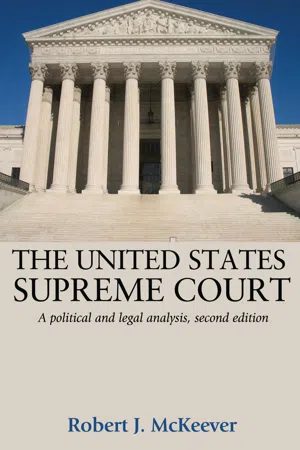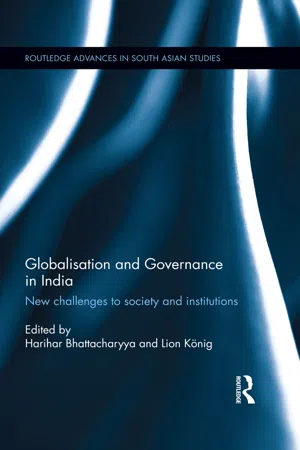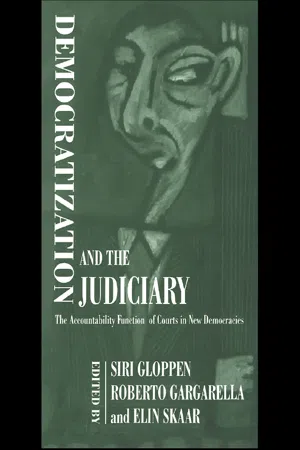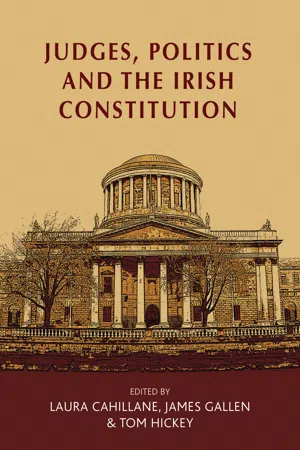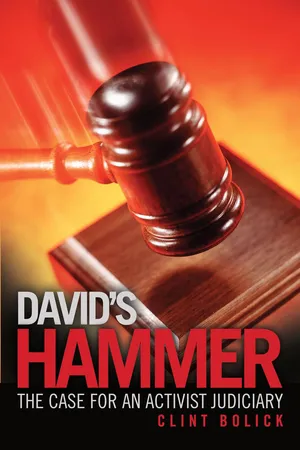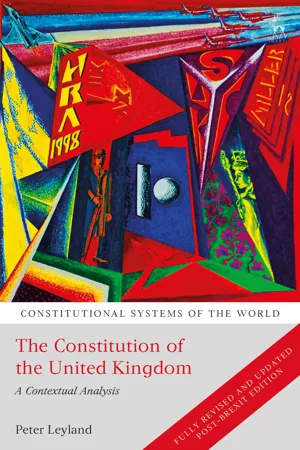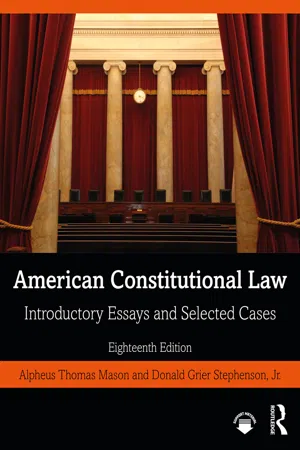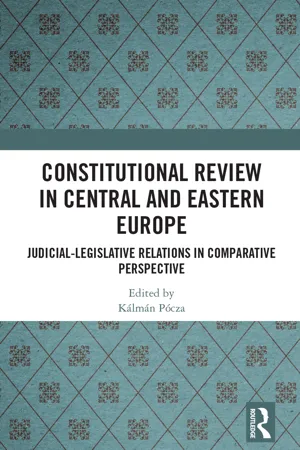Politics & International Relations
Judicial Review
Judicial review is the power of a court to review and potentially invalidate laws or actions of the executive and legislative branches of government that are deemed unconstitutional. This process allows the judiciary to serve as a check on the other branches, ensuring that their actions comply with the constitution. Judicial review is a fundamental aspect of the separation of powers in many democratic systems.
Written by Perlego with AI-assistance
Related key terms
8 Key excerpts on "Judicial Review"
- eBook - ePub
The United States Supreme Court
A political and legal analysis, second edition
- Robert J. McKeever(Author)
- 2016(Publication Date)
- Manchester University Press(Publisher)
4Politics and Judicial ReviewJudicial interpretation: the traditional viewWe saw in theprevious chapterthat the Supreme Court was created as a legal and judicial body, intended to complement rather than rival or duplicate the political branches of the federal government. Yet the very concept of Judicial Review in a constitutional democracy has proved to be inherently political. In this chapter, therefore, we examine the ways in which politics impinges upon Judicial Review and the various attempts that have been made to minimise or maximise the political potential of Judicial Review. We shall assess the extent to which the political characteristics of Judicial Review demand that we view the Court primarily as a political body.As we have seen (Chapter 2 ), in no. 78 of The Federalist Papers, Alexander Hamilton predicted that the Supreme Court would exercise not ‘will’, but ‘merely judgement’. This means that the Justices would be free from political bias or influence in their decisions and simply undertake constitutional interpretation as a neutral exercise in logic and law. An analogy could be made with the categorisation of species: asked to say whether the whale was a fish or a mammal, marine biologists would note the fundamental characteristics of fish and mammals, then those of whales, and decide whether the whale fitted one category’s set of criteria or the other. Our biologist would not be influenced by his or her preference for mammals over fish or society’s views on whaling. Logic and established scientific knowledge and principles would be his or her guide.Such a ‘scientific’ approach to law and constitutional adjudication held sway in legal circles well into the twentieth century. Take, for example, this statement by Justice Roberts in US v. Butler - eBook - ePub
Globalisation and Governance in India
New Challenges to Society and Institutions
- Harihar Bhattacharyya, Lion König(Authors)
- 2015(Publication Date)
- Routledge(Publisher)
5 The new political economy of Judicial Review in India Mahendra Pal Singh DOI: 10.4324/9781315722917-5 Judicial Review and the Constitution Judicial Review, in the sense that the courts of a country can examine whether the actions of the other two branches of the state – the legislature and the executive – are consistent with the constitution of that country, had long been recognised in the countries of the Euro-American tradition well before the constitution-making process started in India in 1946. It was very much part of the Indian law to the extent that the courts could examine if the laws and the executive actions of the government of India or of the provinces were consistent with the provisions of the constitutional acts of British Parliament, such as the Government of India Act, 1935, and similar acts before that. The Constitution makers were, therefore, fully familiar with the exercise of the power of Judicial Review and its pros and cons. They were also familiar with other countries and their constitutions, such as that of the then-Soviet Union and other socialist countries, where this kind of power could not be exercised by the courts. Because, after due deliberations, the Constitution makers decided to have a constitution based on the Euro-American model, it was presumed from the very beginning that the courts would have the power of Judicial Review. It was a conscious decision on their part which did not require the kind of justifications Chief Justice Marshall had to develop one and a half centuries before in Marbury v. Madison 1 in the United States. Such a model of the constitution is based on a philosophy that supports limited powers of the state visà-vis its own citizens. Citizens are attributed certain rights which are considered to be natural and which they are never supposed to have surrendered to the state when, through the so-called social contract, they agreed to establish it - eBook - ePub
Democratization and the Judiciary
The Accountability Function of Courts in New Democracies
- Roberto Gargarella, Siri Gloppen, Elin Skaar(Authors)
- 2004(Publication Date)
- Routledge(Publisher)
5The importance of Judicial Review has also been acknowledged by economists, who have emphasised the role that secure property rights play in encouraging economic growth.6 Cast in the language of enforcement of property rights against expropriation and over-taxation, scholars have developed sophisticated models explaining the contribution of constitutional constraints and Judicial Review in creating ‘credible state commitments’.7 This consensus among economists on the contribution of law and constitutionalism— protected by a strong, efficient, and independent judiciary—to economic growth, have also contributed to the academic acceptance of Judicial Review in Latin America.8Finally, it is worth noting that Judicial Review has also been embraced by a globalized network of nongovernmental institutions interested in the promotion of human rights and economic justice, which also expect their agendas to be furthered by activist courts.9Whatever the reasons behind the current acceptance of Judicial Review as a normal feature of democratic states, the fact is that by the early 1990s most Latin American countries had adopted Judicial Review. One such case was Chile, the subject of the analysis here.Chile’s Mixed System of Judicial Review
The history of Judicial Review in Chile is relatively new, effectively dating from 1980. The new charter incorporated a complex system of Judicial Review of both legislation and administrative acts. This represented a significant change in the country’s legal tradition, which had lacked a meaningful system of Judicial Review of the constitutionality of laws. - eBook - ePub
- Laura Cahillane, James Gallen, Tom Hickey(Authors)
- 2017(Publication Date)
- Manchester University Press(Publisher)
32An Irish version of political constitutionalism?How might the familiar theoretical arguments against Judicial Review be borne out in the Irish experience? First, it should be noted that a number of aspects of Irish constitutional culture, compared, say, to the United States, might attenuate some concerns about the political legitimacy of judicial supremacy.First, the Supreme Court jurisprudence of recent decades has recoiled from the high watermark of judicial supremacy that it (arguably) reached in the 1970s. Much of the judicial discourse has, in effect, tacitly accepted a theory of constitutional indeterminacy – that is, an understanding that the correct or true meaning of constitutional rights cannot be established according to any specifically legal or judicial mode of reasoning – a belief, in effect, that constitutional clauses are essentially indeterminate and open-textured. Alternatively, this can be understood as accepting that legislatures routinely protect and balance competing rights claims, and that they are better positioned in some respects to make such appraisals. Accordingly, the Court has indicated it will defer to interpretations of rights that are enacted by the Oireachtas via primary legislation. Tuohy v. Courtney, for example, established a rather deferential threshold concerning legislative limitations on rights.33 Effectively it acknowledged that legislation not only limits constitutional rights for the sake of utilitarian and social-policy goals, but also to protect other rights; it ‘balances’ rights. Moreover, the Court affirmed that judges will not ‘impose their view of the correct or desirable balance in substitution for the view of the legislature … but rather … determine from an objective stance whether the balance contained in the impugned legislation is so contrary to reason and fairness as to constitute an unjust attack on some individual’s constitutional rights’.34 - eBook - ePub
David's Hammer
The Case for an Activist Judiciary
- Clint Bolick(Author)
- 2007(Publication Date)
- Cato Institute(Publisher)
3. The Origins and Importance of Judicial Review The quarrel of those who question the power of the judiciary to review legislative and executive acts is not only with imperial judges but also with the Framers of the Constitution themselves. Although most on the right who criticize judicial activism urge that the Constitution ought to be interpreted in accord with its original intent, curiously they rarely have recourse to original intent in ascertaining the proper role of the judiciary. If they did, they would find that the Framers intended the judiciary to play a central and vigorous role in protecting liberty. If judicial activism is defined as courts’ striking down unconstitutional laws, then in a very real sense, the Framers were the original judicial activists. 1 Judicial Review was not an original creation of the American Constitution. In England, although courts lacked power to overturn acts of Parliament, they often did invalidate acts of the crown and of local governments. Likewise, early American state courts frequently struck down laws under their own state constitutions. 2 Hence the Framers were acutely aware of the important role of the courts in protecting liberty. The idea of an independent judiciary empowered to strike down laws as unconstitutional emanated from two core principles. First, the Framers believed that the ultimate expression of popular sovereignty was the organic law, the Constitution, to which all governmental actions and democratic processes were subordinate. 3 Second, the Framers recognized that the tendency of the legislative and executive branches to expand their powers was inherent in the nature of republican government - eBook - ePub
The Constitution of the United Kingdom
A Contextual Analysis
- Peter Leyland(Author)
- 2021(Publication Date)
- Hart Publishing(Publisher)
22Judicial Review has been deployed as a way of checking a trend by which Parliament grants ministers sweeping delegated powers by the use of what are called ‘Henry VIII clauses’23 (see also Chapters 5 and 10 ). The Legislative and Regulatory Reform Act 2006 was the focus of particular concern, because in its original form this measure proposed that ministers would have the power to alter any law passed by Parliament (thus going far beyond the Deregulation and Contracting Out Act 1994, which also give quite wide discretionary powers to ministers in a particular area). But should the judges depart from the sovereignty of Parliament established under the 1689 Bill of Rights? Any refusal by the courts to apply valid legislation would be a radical departure from constitutional principle and it would amount to a highly controversial development. This would mark a shift in the current balance of the constitution away from the executive, which is notionally accountable to an elected Parliament. Further, the danger is that a government with a majority in Parliament might respond by seeking to curb the powers of the courts.Although the UK lacks a codified constitution with the introduction of so much legislation with constitutional implications, the position has changed in recent years. For example, the European Communities Act 1972 under sections 2 and 3 qualified the doctrine of sovereignty by recognising that a competing source of law was judicially enforceable in the courts. Up until UK withdrawal from the EU English courts were required to put into effect laws passed by EU institutions24 even to the extent of suspending the provisions contained in domestic legislation. Moreover, the interpretative powers of the courts were extended by the adoption of a rule of construction approach, which holds that words in a statute should be read to have a meaning that was consistent with Community law, even if this involves a departure from the language used in the statute.25 Of course under the Brexit Withdrawal legislation26 the supremacy of EU law no longer applies prospectively but section 5(2) allows for the continuing supremacy of pre-existing EU law. The revised interpretative rules in the European Union (Withdrawal Agreement Act) 2020 allow Ministers of the Crown to issue regulations to any ‘relevant court or tribunal’ on how to interpret and even to dis-apply EU retained case law as well as domestic case law which relates to EU retained case law.27 - eBook - ePub
American Constitutional Law
Introductory Essays and Selected Cases
- Donald Grier Stephenson Jr., Alpheus Thomas Mason(Authors)
- 2021(Publication Date)
- Routledge(Publisher)
I begin, then, by observing that in this country, the powers of the judiciary are divisible into those that are POLITICAL and those that are purely civil. Every power by which one organ of the government is enabled to control another, or to exert an influence over its acts, is a political power… .The constitution and the right of the legislature to pass the act, may be in collision. But is that a legitimate subject for judicial determination? If it be, the judiciary must be a peculiar organ, to revise the proceedings of the legislature, and to correct its mistakes; and in what part of the constitution are we to look for this proud pre-eminence? Viewing the matter in the opposite direction, what would be thought of an act of assembly in which it should be declared that the supreme court had, in a particular case, put a wrong construction on the constitution of the United States, and that the judgment should therefore be reversed? It would doubtless be thought a usurpation of judicial power. But it is by no means clear, that to declare a law void which has been enacted according to the forms prescribed in the constitution, is not a usurpation of legislative power… . It is the business of the judiciary to interpret the laws, not scan the authority of the lawgiver; and without the latter, it cannot take cognizance of a collision between a law and the constitution. So that to affirm that the judiciary has a right to judge of the existence of such collision, is to take for granted the very thing to be proved.But it has been said to be emphatically the business of the judiciary, to ascertain and pronounce what the law is; and that this necessarily involves a consideration of the constitution. It does so: but how far? If the judiciary will inquire into anything besides the form of enactment, where shall it stop? … - eBook - ePub
Constitutional Review in Central and Eastern Europe
Judicial-Legislative Relations in Comparative Perspective
- Kálmán Pócza(Author)
- 2024(Publication Date)
- Routledge(Publisher)
Although the term was first introduced in the context of studies on Western European courts, as a general theorization of constitutional review, it is also worth mentioning in the context of CEE countries. Volcansek proposed this approach based on the Italian Constitutional Court’s jurisprudence (Volcansek 2001), later Hönnige and Brouard nuanced the picture, if not on the Italian, but on the role of the French and German constitutional courts. Using quantitative methods, they concluded that they play the role of a veto player only under certain conditions, and their role may be influenced by, for example, the legislative procedure or the ideological composition of the court (Brouard and Hönnige 2017). However, Tsebelis, for example, did not count (constitutional) judges as veto players (because they are absorbed by other political veto players) but added that they could be included in this role under certain conditions (Tsebelis 2002). Lijphart conceptualized Judicial Review as part of a “consensus model of democracy” and also attempted to group 36 countries of the world (including a significant proportion of Western European countries) according to the strength of Judicial Review. He sets up four groups, the first group comprising those lacking Judicial Review. Those with Judicial Review are classified by Lijphart into “strong”, “medium-strength”, or “weak” categories based on the “degrees of activism in the assertion of this power” (Lijphart 2012). Vanberg used game-theory analysis to conceptualize the relationship between abstract Judicial Review and legislation, how different judicial behaviours influence the behaviour of the legislative majority, while the latter aims to ensure that legislation passes abstract review or that the opposition does not initiate the review process. Vanberg’s results show that abstract review fits Lijphart’s model of consensus democracy only when the court is not overly deferential
Index pages curate the most relevant extracts from our library of academic textbooks. They’ve been created using an in-house natural language model (NLM), each adding context and meaning to key research topics.
